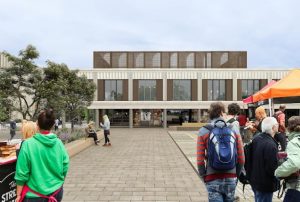How businesses can boost their impact on communities

Steph Taylor took over as chief executive of Leeds Community Foundation in January after serving as deputy to former chief executive Kate Hainsworth for the previous three years.
TheBusinessDesk.com caught up with her recently to talk about her new role as head of the largest independent community funder in Leeds and Bradford.
As chief executive, Taylor’s strategy is to strengthen the foundation’s existing links within the two cities.
“I’m lucky because there’s a really fantastic platform to build on in terms of our reputation, our reach and our networks in place. We know what’s happening in terms of philanthropy in the city and with communities in the city.”
The foundation eschews traditional fundraising, instead relying on donations from local businesses and individual philanthropists, matched by statutory grants, so that it does not compete for public donations with the very organisations it seeks to support.
Last year it supported more than 300 community organisations with grants totalling more than £3m.
“We are the only vehicle through which businesses and individuals can invest in philanthropy strategically at scale in the cities,” Taylor said. “The reason that’s important is because business and individual giving is what can support communities to do what needs doing on their own agenda, and it can enable long-term action on some of our really entrenched social issues with communities.”
Unlike statutory grant programmes, she said, there is no external agenda or specific requirements for funding. “We’re not saying to community organisations, ‘We need you to deliver these things,’ we’re saying, ‘Tell us what you can deliver.’ It’s bottom up. It’s grassroots communities in Leeds and Bradford.
“Part of our role is to look at the opportunities for strategic and collective change, which philanthropy can do because you can have several businesses coming together to tackle a problem,”
She cited the foundation’s partnership with Leeds City Council to create the Leeds Digital Inclusion Fund, which has so far provided around 300 people with the skills, tools and equipment they need to be active online. It is funded through the Leeds Digital Charity Ball.
“The digital community come together to raise funds through that even, but we also look for ways for them to look at brokering and volunteering for communities that are tackling digital inclusion. It allows us to take that long-term look at the gaps, working with statutory partners and ensure that philanthropy can really make a difference in the short and long term.”
As deputy chief executive, Taylor developed and led GiveBradford as part of Leeds Community Foundation. Both her parents are Bradfordians.
“Both cities are different. They need different things. But there’s a community foundation for Leeds working across both cities, and the perception was that that meant it wasn’t necessarily doing the right thing by the people of Bradford.
“Now we have a separate board for Bradford, made up of Bradfordians who make these decisions and help us think about the right strategy for the way grants are delivered there.”
With a sluggish economy, and many businesses looking more to resilience than growth, Taylor said the Leeds Community Foundation provided an efficient way to promote social good.
“Money is needed more than ever to help communities and support charitable endeavour. It’s also therefore even more important than ever to work with experts who can make sure that money does make a difference locally in the places that matter to you.
“It’s money that builds endowment, that secures legacies, so that community organisations can keep doing what they do. That benefits all of us who live in Leeds and Bradford.”
For more information on Leeds Community Foundation and GiveBradford, and how you can help, visit its website.








